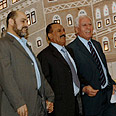
Factions' representatives in Yemen
צילום: AFP
Fatah: Yemeni proposal signed due to mixup
Top aides to Palestinian President Abbas distance themselves from Yemeni plan outlining path to reconciliation with Hamas
Top aides to Palestinian President Mahmoud Abbas on Monday distanced themselves from a Yemeni plan outlining a path to reconciliation with Hamas movement, and one said an Abbas envoy only signed the document because of a mixup.
Under the Yemeni proposal, signed Sunday, Abbas' Fatah movement and Hamas would agree in principle to unite in a single Palestinian government. However, in several days of talks in Yemen, the bitter rivals failed to resolve the crucial question of how they should share power.
Hamas and Fatah briefly ruled together last year until internal fighting led to Hamas' violent takeover of Gaza in June. A renewed coalition would likely spell the end of peace talks with Israel and of broad international support for Abbas, making it unlikely he will enter another partnership with the Islamists. His aides said he remains bitter over the Gaza takeover and is deeply suspicious of Hamas' motives.
Abbas has said repeatedly that he would not negotiate a new power-sharing deal with Hamas unless it first steps aside in Gaza. Despite Hamas' refusal to do so, Abbas sent a representative, former Deputy Palestinian Prime Minister Azzam al-Ahmed, to Yemen to explore the reconciliation proposal _ apparently to avoid being seen as inflexible on trying to mend the deep internal Palestinian rift.
On Sunday, al-Ahmed and a senior Hamas representative, Moussa Abu Marzouk, signed a declaration that both accept a Yemeni initiative calling for the creation of a national unity government and the rebuilding of security forces loyal to that government instead of factions.
'Abbas was busy hosting Cheney'
A senior Abbas confidant, chief Palestinian negotiator Ahmed Qureia, said Monday that al-Ahmed signed because of a mixup. Al-Ahmed called Abbas' office repeatedly to get guidance, but Abbas was meeting at the time with US Vice President Dick Cheney, and al-Ahmed went ahead and signed, Qureia said."There was a misunderstanding," Qureia told reporters Monday. "President Abbas was busy hosting Cheney, and Azzam tried many times to contact him (Abbas), but couldn't reach him. The talks were at the end, and time was pressing."
Other senior Abbas aides said al-Ahmed should not have signed the agreement.
"Hamas is trying to lead us to endless talks without backing away from its military coup," aide Yasser Abed Rabbo told the Voice of Palestine radio. "Hamas is giving no signs of doing so. On the contrary, it gives more signs of repression and taking over more Palestinian Authority institutions in Gaza."
Abbas said in a statement Sunday that he didn't consider the Yemeni plan a basis for negotiations with Hamas. Either it is implemented, as is, starting with Hamas stepping aside, or it is dropped, he said.
Hamas said the initiative by Yemeni President Abdullah Saleh was all about dialogue and could not be implemented immediately. "Not a single article of the Yemeni initiative can be implemented without coming to an understanding - there should be a dialogue since practically speaking (the immediate implementation) you demand cannot take place," Abu Marzouk said at a press conference in San'a.
Israel is not taking the Hamas-Fatah talks too seriously, an Israeli official said Monday. But if Abbas actually agrees to share power with Hamas, that would mean the end of the peace talks, the official said. He spoke on condition of anonymity because he was not authorized to discuss the matter with the press.
Meanwhile, a senior US administration official traveling with Cheney said the US has made it clear that it will not support working with Hamas unless there is a fundamental change in the group's current role. Israel, the US and the European Union consider Hamas a terrorist group.
Hamas rose to power in early 2006, after trouncing Fatah in parliament elections. Hamas formed a government for the West Bank and Gaza, but the world boycotted it because of its refusal to renounce violence and recognize Israel's right to exist.
Facing bankruptcy, Hamas was forced to bring Fatah back into a national unity government, but that did not satisfy the international community. After the Gaza takeover, Abbas dismissed the unity government and its Hamas prime minister, Ismail Haniyeh from Gaza, and installed his own government in the West Bank.
The West has embraced Abbas' new team while maintaining a boycott of Hamas in Gaza.










